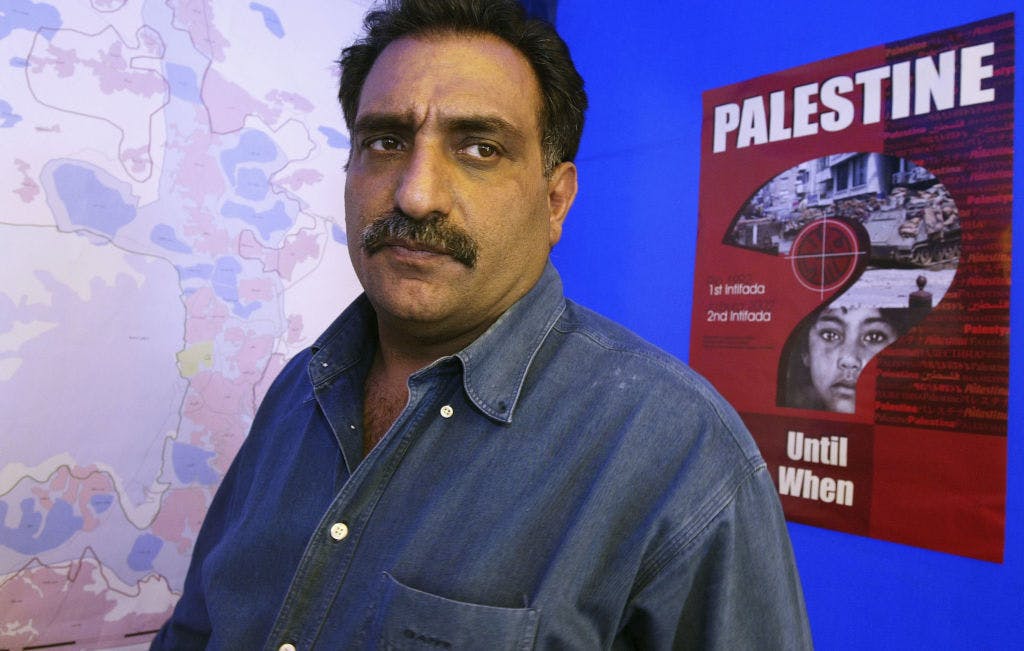Was a Former Knesset Member, Azmi Bishara, Instrumental in Creating the ‘Genocide’ Myth About Israel?
An Israeli journalist is tracing South Africa’s ‘genocide’ case in the International Court of Justice to a November 28 lecture that the Doha-based Mr. Bishara gave to the Arab Center for Research and Policy Studies, which he heads.

Azmi Bishara, in addition to being a secular, pan-Arab intellectual with Christian and Marxist roots — and a former member of Israel’s Knesset to boot — is sort of a Svengali to the emir of Qatar, one of Arabia’s most Islamist, nationalist, and anti-Israel countries. Mr. Bishara also may have been instrumental in creating the myth that the country of his birth is guilty of “genocide.”
An Israeli journalist, Makor Rishon’s Pazit Ravina, is tracing South Africa’s “genocide” case in the International Court of Justice to a November 28 lecture that the Doha-based Mr. Bishara gave to the Arab Center for Research and Policy Studies, which he heads. Citing “judicial sources at London,” Ms. Ravina writes that the 67-year-old Mr. Bishara is “one of the main forces” behind Pretoria’s case.
In his lecture, Mr. Bishara looks at the elements that constitute genocide in international law, arguing that it applies to Israel’s war of independence, which the Arabs call the “nakba,” or catastrophe. Even more so, he adds, Israel is guilty of genocide in the current Gaza war, which was launched by Qatar’s ally, Hamas, on October 7.
“In the case of Israel, it is clear that it planned to displace the population of the Gaza Strip, and there have been public calls to exterminate the Palestinian population there,” Mr. Bishara argued in November. In what looks like a painstakingly detailed case, he relies on many of the arguments and quotes from Israelis that South Africa’s lawyers ended up using at the Hague in January.
President Ramaphosa of South Africa visited Doha 10 days before Mr. Bishara made his case. The Prerotria guest made the first mention of the word “genocide” in the context of the Gaza war at that time. Ms. Ravina argues that Mr. Bishara had by then already gathered most elements of the accusation. Considering his status in Emir Tamim’s inner circle, he could have sown the seed of the case then.
“This is obviously not a one-man show,” Ms. Ravina tells the Sun. “Many were involved in cooking up this allegation. Yet, Bishara has always said that you need to talk to the West in Western terms. He is the secular intellectual who has the wherewithal to help develop such a case.”
The extent of Mr. Bishara‘s influence over Sheikh Tamim is unclear. “He’s really the brain behind the emir,” a European businessman working at Doha told the Sun during a visit to Qatar several years ago. “He’s nothing but a secular fig leaf for Qatar,” the founder of the Middle East Media Research Institute, Yigal Carmon, counters.
“It is no secret in Doha that Bishara is close to the emir,” a Western diplomat who travels often to the region tells the Sun, asking not to be quoted by name. “The Qataris are financing for him the Arab Center, which is a combination graduate school, think tank, a television station, and a London-based Arabic newspaper.”
Yet, the diplomat adds, while Mr. Bishara gives advice to the Qatari leadership, “I don’t think they do a lot of things he tells them.” The Arab Center media arm, he adds, is but a poor relation of Qatar’s most influential mouthpiece, Al Jazeera.
Mr. Bishara has little following outside the emir’s inner circle. Instead, his main asset is that he is seen as a deep-thinking intellectual. “I used to interview him when he was in the Knesset,” Ms. Ravina says. “He was the most brilliant guy in the house.”
Born at Nazareth, in northern Israel, to an Arab-Christian family, Mr. Bishara started his political career as a student activist. He spent the mid-1980s in East Germany, where he earned a Ph.D. in philosophy from Humboldt University. In 1995 he was elected to the Knesset atop a party he founded, the National Democratic Assembly, or Balad.
Cultivating relations in the Arab world, he often traveled to enemy countries, including Syria and Lebanon. The Israeli government may have used him as a conduit to leaders there. Yet, in 2003, he was almost banned from re-election for making anti-Israeli speeches at Damascus.
Following the 2006 Hezbollah-Israel war, Mr. Bishara became a subject of criminal investigations. According to unsealed documents, the top allegation was that he supplied Hezbollah with strategic targets inside Israel in exchange for payments. The charge did not get to court, as he fled the country for good, claiming he could never get a fair trial there.
Mr. Bishara ended up at Doha, where his deep insights into Israeli society have helped him gain influence in a country that sponsored Hamas and other terrorist groups. “Shame,” Mr. Carmon says. “A man of Israel’s Arab nationalist left ended up alongside 7th Century Islamists and Hamas murderers.”

